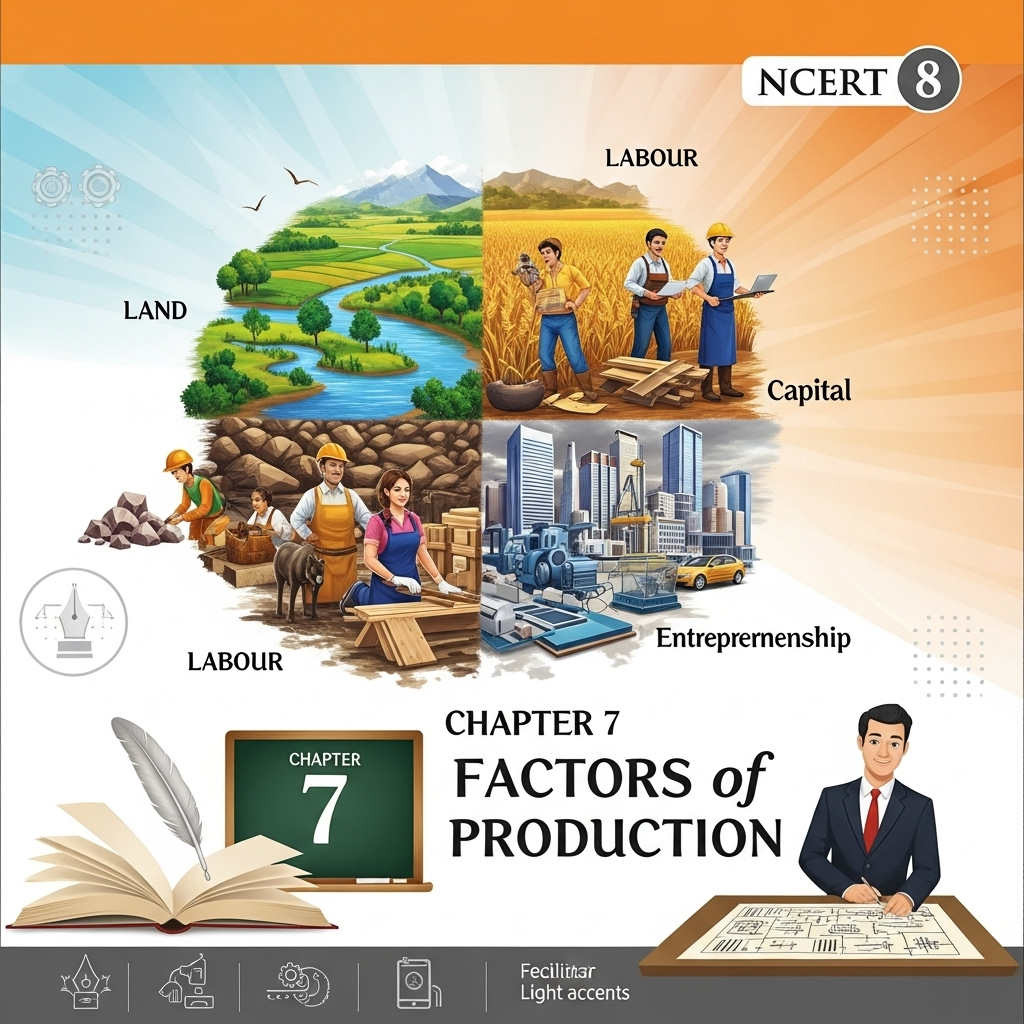Chapter Overview
4
Main Factors of Production
Land
Natural Resources
Labour
Human Effort
Capital
Man-made Resources
What You'll Learn
Factors of Production
Understanding land, labour, capital, and entrepreneurship as key inputs.
Interconnections
Exploring how factors combine in production processes.
Human Capital
Role of skills, knowledge, and facilitators like education.
Technology's Role
How technology enhances efficiency in using factors.
Historical Context
This chapter discusses efficient use of land, labour, and capital for India's growth, as noted by Bibek Debroy. It examines production processes for goods like clothes and furniture, classifying inputs into four factors, with technology as a facilitator. Examples like Ratna's restaurant illustrate real-world application.
Key Highlights
Factors are interconnected; human capital is enhanced by education/training. Businesses combine inputs to create goods/services, generating economic activities. Local reports highlight diverse inputs in shops/restaurants.
Summary of All Topics
- Introduction: Production involves inputs like land, labour, capital, entrepreneurship; technology facilitates efficiency.
- Factors of Production: Classified as land (natural resources), labour (human effort), capital, entrepreneurship.
- Land: Includes soil, forests, water, minerals; businesses buy/rent it.
- Labour: Physical/mental effort; varies by skill/knowledge.
- People as Resource: Human capital: specialized skills/knowledge for efficient labour.
- Facilitators of Human Capital: Education/training for knowledge/skills; health for productivity.
- Interconnections: Factors combine; e.g., land + labour + capital in farming.
- Role of Human Capital: Applies knowledge to create goods/services; requires dedication.
- Business Examples: Restaurant needs location (land), staff (labour), equipment (capital).
- Local Economic Activities: Goods/services in shops; inputs like produce, tools.
Comprehensive Chapter Summary
1. Introduction to Factors of Production
The chapter quotes Bibek Debroy on efficient use of land, labour, capital for India's growth. It explains production processes for goods like clothes, using inputs classified as factors: land, labour, capital, entrepreneurship. Technology facilitates more output.
2. Definition and Importance
Factors Classification
Land (natural), labour (human), capital (man-made), entrepreneurship (organization).
Key Benefits
Combine to create goods/services, generate economic activities/opportunities.
Business Example
Ratna's restaurant: location, money, staff, ingredients.
3. Land as Factor
Natural Resources
Includes soil, forests, water, minerals; businesses purchase/rent.
Usage Examples
Recalls natural resources chapter; used in production.
Local Application
Items like vegetables labelled 'land' in reports.
4. Labour and Human Resources
Effort Types
Physical/mental; carpenters, farmers, engineers vary in strength/knowledge.
5. Human Capital and Facilitators
Role
Specialized skills/knowledge; e.g., police maintain order, scientists invent.
Facilitators
Education/training for knowledge; health for productivity.
6. Interconnections and Examples
Factors interconnected; technology enables efficiency. Local shops show diverse inputs/goods.
Questions and Answers from Chapter
Short Questions
Q1. What are the factors of production?
Answer: Land, labour, capital, entrepreneurship.
Q2. How are these factors interconnected?
Answer: Combined in production processes.
Q3. What is the role of human capital in production?
Answer: Provides specialized skills/knowledge.
Q4. What are its facilitators?
Answer: Education, training, health.
Q5. What are the different types of goods and services being made or provided?
Answer: Groceries, meals, vegetables, repairs, haircuts.
Q6. Where do people get the money that they need for their business?
Answer: Capital sources like savings/loans.
Q7. Where did the hairdresser get trained?
Answer: Through education/training.
Q8. Who taught the food vendors to cook?
Answer: Skills from training/practice.
Q9. What motivated the business owners to start their business?
Answer: Entrepreneurship drive.
Q10. Which of the items on your list can be labelled as ‘land’?
Answer: Vegetables, fruits, produce.
Q11. What are the different types of inputs required?
Answer: Raw materials, tools, skills.
Q12. What is land in economics?
Answer: Natural resources.
Q13. What is labour?
Answer: Physical/mental effort.
Q14. What is human capital?
Answer: Skills and knowledge.
Q15. What is technology's role?
Answer: Facilitates efficiency.
Medium Questions
Q1. What are the factors of production?
Answer: Land (natural resources), labour (effort), capital (man-made), entrepreneurship (organization); technology facilitates. (3 marks)
Q2. How are these factors interconnected?
Answer: Combined in processes; e.g., land + labour + capital for goods. (3 marks)
Q3. What is the role of human capital in production, and what are its facilitators?
Answer: Provides skills for efficiency; facilitators: education, training, health. (3 marks)
Q4. What are the different types of goods and services being made or provided?
Answer: Food grains, meals, vegetables, repairs, grooming. (3 marks)
Q5. Where do people get the money that they need for their business?
Answer: From capital: savings, loans, investments. (3 marks)
Q6. Where did the hairdresser get trained?
Answer: Through education/practice in salons. (3 marks)
Q7. Who taught the food vendors to cook?
Answer: Skills from family/training. (3 marks)
Q8. What motivated the business owners to start their business?
Answer: Entrepreneurship: opportunities, needs. (3 marks)
Q9. Which of the items on your list can be labelled as ‘land’?
Answer: Fresh produce like vegetables/fruits. (3 marks)
Q10. What are the different types of inputs required?
Answer: Packaged goods, ingredients, tools, skills. (3 marks)
Q11. What is land in economics?
Answer: Natural resources: soil, water, minerals. (3 marks)
Q12. What is labour?
Answer: Effort in production: physical/mental. (3 marks)
Q13. What is human capital?
Answer: Specialized skills for efficient work. (3 marks)
Q14. What is technology's role?
Answer: Enables more with fewer inputs. (3 marks)
Q15. How do businesses combine inputs?
Answer: To create goods/services efficiently. (3 marks)
Long Questions
Q1. What are the factors of production?
Answer: Factors are inputs in production: land (natural resources like soil, water, minerals), labour (physical/mental effort), capital (man-made tools/equipment), entrepreneurship (organizing factors). Technology facilitates efficiency, enabling more goods with fewer inputs.
Q2. How are these factors interconnected?
Answer: Factors combine in processes; e.g., in Ratna's restaurant, land (location), labour (staff), capital (equipment), entrepreneurship (planning). Interdependence creates goods/services, generates activities.
Q3. What is the role of human capital in production, and what are its facilitators?
Answer: Human capital provides specialized skills/knowledge for efficient labour; e.g., engineers apply expertise. Facilitators: education (knowledge gain), training (skill development), health (productivity maintenance).
Q4. What are the different types of goods and services being made or provided?
Answer: Goods: food grains, vegetables, mobile accessories; services: cooked meals, repairs, grooming. Local reports show diversity in economic activities.
Q5. Where do people get the money that they need for their business?
Answer: From capital: personal savings, loans, investments; e.g., Ratna organized money for rent/equipment.
Q6. Where did the hairdresser get trained?
Answer: Through education/training programs, practice; part of human capital development for skills.
Q7. Who taught the food vendors to cook?
Answer: Skills from family, training, experience; enhances human capital for production.
Q8. What motivated the business owners to start their business?
Answer: Entrepreneurship: identifying opportunities, applying knowledge/skills to organize factors.
Q9. Which of the items on your list can be labelled as ‘land’?
Answer: Fresh produce, vegetables, fruits; natural resources used in production.
Q10. What are the different types of inputs required?
Answer: Packaged goods, ingredients, tools, skills; correspond to factors like land, capital, human capital.
Q11. What is land in economics?
Answer: Encompasses natural resources: soil, forests, water, minerals, sunlight; gifted by nature, used/rented.
Q12. What is labour?
Answer: Physical/mental effort; varies by roles like carpenters, engineers; contributes to goods/services.
Q13. What is human capital?
Answer: Specialized skills/knowledge beyond basic labour; e.g., inventors, chefs apply expertise.
Q14. What is technology's role?
Answer: Facilitator enabling efficient use of factors; produces more with same/fewer inputs.
Q15. How do businesses combine inputs?
Answer: Organize factors to create value; e.g., restaurant uses all for meals, generating opportunities.




